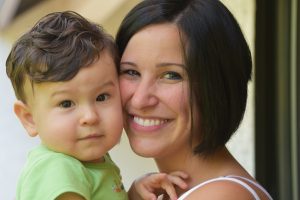They are more instrumental than you might think
By Dr. Ruth Kenworthy
Caring for your baby or toddler’s delicate teeth is a little more complicated than many parents think. Decay is a common problem for baby teeth and Dr. Kenworthy’s tips for child oral hygiene will leave you more informed on this important topic.
It seems pretty obvious – children’s teeth are important. However, many of my patients don’t realize exactly how important oral care for children can be. Your child’s teeth have a basic physical function – being strong and healthy in order to chew food. This is the first step of digestion. They also function by allowing your child to speak properly, and of course, have an amazing smile.
Yet one of their most vital functions that we don’t often consider is that they are saving a space for adult teeth to enter later. By saving this space in the jaw, each baby tooth ensures that the neighboring teeth do not move into the wrong space. If they do, there may not be enough room for the adult teeth to come in later. This can cause crowding or crooked placement of teeth.
Some possibly serious problems, such as tooth trauma, may require emergency attention during infancy. Aside from these problems, I recommend that your child have their first dental examination, including x-rays, cleaning and a fluoride treatment, by the age of two years and six months. Following the initial appointment, they should be seen for a check-up regularly every six months. If you have any questions for me regarding your child’s oral health, please write them down and bring them with you to the initial appointment. This is a great time to ask!
Aside from physical examination, I’ll also discuss hygiene, nutrition and preventative techniques with you. In the meantime, here are some quick tips to help prevent decay:
- Prior to any teeth coming in, wipe your baby’s gums with a damp washcloth after feeding. Not only does this help with cleanliness, but it also allows your child to get used to the idea of cleaning the inside of their mouth.
- Once the first tooth comes in, begin brushing. You can also continue to clean the gum areas that remain toothless.
- Begin flossing when all baby teeth have come in. This is usually around age two or two and a half.
- Do not allow your child to fall asleep with milk, formula, juice, etc. If your child needs a comforting beverage between feedings, use cool water.
- If you do not give your child local water containing fluoride, ask me how you can supplement it.
- Do not allow a baby to drink out of a glass or use utensils, this can cause tooth trauma.
- Please call us immediately if you notice what looks like stains or dark areas on your child’s teeth.


